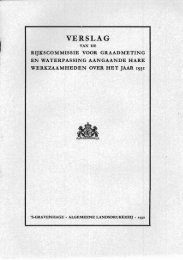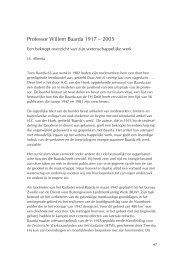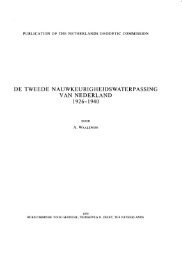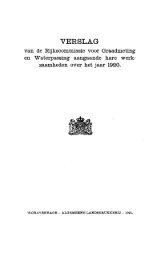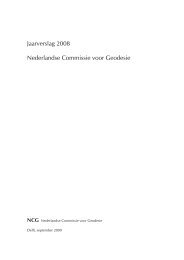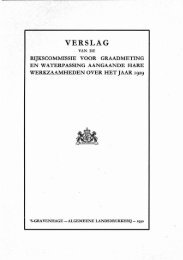SDI Convergence - Nederlandse Commissie voor Geodesie - KNAW
SDI Convergence - Nederlandse Commissie voor Geodesie - KNAW
SDI Convergence - Nederlandse Commissie voor Geodesie - KNAW
Create successful ePaper yourself
Turn your PDF publications into a flip-book with our unique Google optimized e-Paper software.
Cooperation – a Key Factor for Sustainable Spatial Data<br />
Infrastructure<br />
E. Olof Olsson<br />
KTH, the Royal institute of Technology, Stockholm, and Lantmäteriet, Gävle, Sweden<br />
olof.olsson@lm.se<br />
Abstract<br />
Questions of cooperation are essential in the process of constructing and operating<br />
spatial data infrastructures (<strong>SDI</strong>s). However, even if cooperation in this field is often<br />
regarded as an important factor it is seldom a prime target for studies and research.<br />
This is in contrast to other fields where breakthroughs have been made with cooperation<br />
in focus. In this article, the concept of cooperation is explored in relation to <strong>SDI</strong>.<br />
Based on a literature study as well as experiences in the Swedish <strong>SDI</strong>, different stages<br />
of cooperation are presented and linked to <strong>SDI</strong> development. The research shows that<br />
research on cooperation in the context of <strong>SDI</strong> is gaining momentum and is very relevant<br />
to <strong>SDI</strong> development. The resulting problem analysis presents directions for further<br />
research.<br />
Keywords: Spatial data infrastructures (<strong>SDI</strong>), cooperation, collaboration, coordination.<br />
1. INTRODUCTION<br />
Cooperation is an intensely discussed ‘method’ used for production and further management<br />
of spatial data. Complex interrelationships can often occur in the field of spatial<br />
data. Not only are the cooperating parties concerned but there are also other important<br />
actors. One, governments - and organisations like the European Union - stand<br />
for power and decisions and set many rules affecting the handling and use of spatial<br />
data. At the other end is the market which should ultimately set the agenda. In between<br />
there is some sort of association of organisations for which good and working cooperation<br />
is a critical factor for success.<br />
Within the field of <strong>SDI</strong>, cooperation has often been treated as an important factor and a<br />
number of studies have touched different aspects of cooperation (see Clausen et al.,<br />
2006; Harvey, 2001; Onsrud and Rushton, 1995). However, there are few studies were<br />
cooperation is the main target of research. This is somewhat surprising, because in<br />
many other areas such as economy, biology and different social and organisational<br />
subjects, cooperation is given a lot of attention and some breakthroughs have been<br />
made during the last 20 years. A better understanding of the mechanisms behind cooperation<br />
within spatial data administration and the creation of national spatial data<br />
infrastructures can improve efficiency and lead to greater benefits within this area.<br />
It is perhaps a paradox that the cold war after the Second World War boosted discussions<br />
and research about cooperation. Cooperation in this respect is often handled as<br />
an important step on the road away from conflict and war. Areas of conflict research<br />
and conflict handling are not the main scope of this study. However, cooperation and<br />
conflict handling are intertwined and a better understanding of how conflicts emerge<br />
and should be handled can also be a starting point for studies on cooperation. There<br />
are many roads that lead to questions of cooperation.<br />
229







